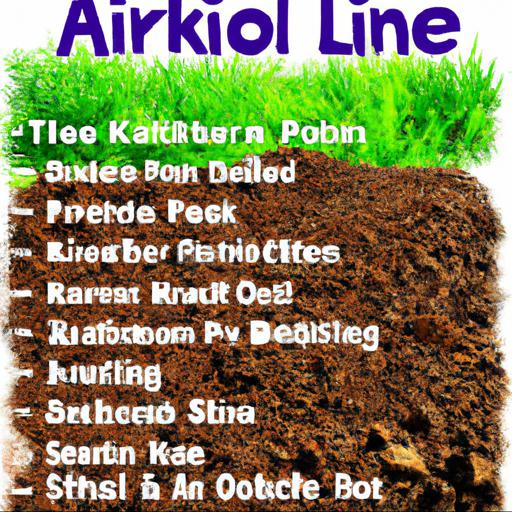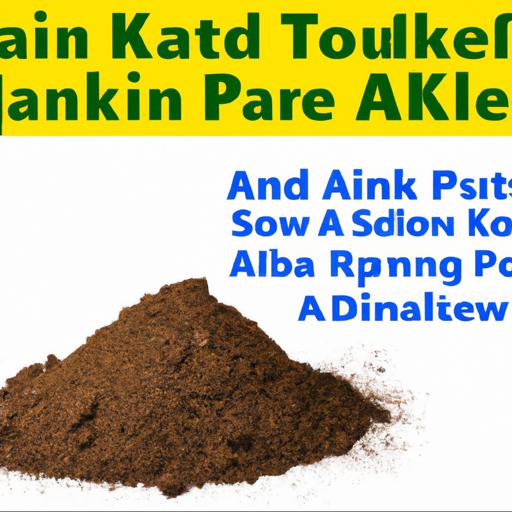Are you looking to get the best out of your alkaline soil? If so, you’re in the right place.
In this blog, we’ll explore the benefits of alkaline soil, how to make sure you’re getting the most out of it, and how to maintain it for optimal results. We’ll also look at some of the best plants to grow in alkaline soil and how to ensure their success. With our help, you’ll be able to get the very best from your alkaline soil and enjoy a flourishing garden.
Benefits of alkaline soil

Soil pH is an important factor to consider when gardening in the UK. Alkaline soils, which have a pH higher than
0, have quite different properties from acidic soils, providing a unique challenge to gardeners. But with the right approach, gardeners can turn a soil’s alkalinity into a major benefit. Alkaline soils are generally free draining and high in calcium, a mineral that helps promote the development of strong root systems.
Plants with high calcium requirements, like roses and dahlias, can take full advantage of the nutrients in alkaline soils to help them thrive. More heavily rooted plants, such as trees and shrubs, can also benefit from the improved drainage of alkaline soils.
In addition to favoring certain plants, alkaline soils are also helpful in keeping harmful insect pests at bay. Certain common root feeders, like slugs and snails, are less likely to flourish in alkaline soils and can be more easily kept in check. For gardeners with a need to control weeds, soils with a high pH can also help reduce the germination rate of weed seeds, helping to keep problem patches at bay.
Overall, gardeners with alkaline soils have the potential to get the best from their garden. With the right approach, the unique properties of alkaline soils can be used to the gardener’s advantage, allowing for a fuller, healthier garden. So long as gardeners remember to take the particular soil type into account, a better garden can be had with just a few minor adjustments.
How to get the best from alkaline soil

As a garden expert in the UK, I understand that certain soils can be particularly challenging to work with. Alkaline soil, in particular, can be especially tricky because plants may take fewer nutrients from alkaline soils than they would from soils with other pH levels. However, with proper knowledge and the right techniques, you can get the best out of your alkaline soil.
For plants to thrive in alkaline soil, it needs to be managed in the right way. Firstly, make sure you test the soil before you start to work on it.
This can help to determine the specific pH of the soil and gives you an idea of what plants will do best in it. Secondly, add amendments to your soil in order to neutralize its pH.
Adding organic matter to the soil, such as peat moss and compost, can help reduce its alkalinity. Once your soil is ready for planting, it’s important to think about the types of plants you want to be growing in it. Plants such as rhododendrons, azaleas, and blueberries are naturally adapted to thrive in alkaline soil.
On the other hand, certain vegetables like spinach and carrots can struggle to grow in alkaline environments. If you’re looking to grow vegetables in an alkaline soil, make sure to select ones that are better suited for it, like kale and cauliflower.
Finally, it’s essential to remember to water and fertilize your plants regularly. Alkaline soils can have the tendency to suck much-needed nutrients out of the soil and should be fertilized at least 2-3 times a year. Choosing the right type of fertilizer is also key; organic fertilizers are best for alkaline soils and will help to balance pH levels, while chemical fertilizers are not recommended as they can further upset your soil’s essential nutrient balance.
If you follow these tips, you should be able to get the best out of your alkaline soil. By understanding and managing your soil’s pH levels and selecting the right type of plants for it, you can create a healthy, flourishing garden.
Common challenges with alkaline soil

Gardener’s Guide to Getting the Best from Alkaline SoilGardening enthusiasts in the United Kingdom, who live in areas with alkaline soil, know it can be a challenge to get the best from their gardens. Alkaline soil often has a high pH level, which can impede the uptake of important nutrients and minerals for plants, making them less able to thrive.
Fortunately, it’s possible for gardeners to address this issue through the use of special products and techniques. To begin with, gardeners should always assess their soil’s properties and condition, including its pH and levels of calcium, iron, and other minerals. Once they have determined their soil’s specific needs and characteristics, there are a variety of approaches they can use to help their plants get the most benefit.
One important tactic is to raise fertilizer levels and adjust application rates. Applying high quality fertilizer specifically tailored to alkaline soil can help nourish plants and establish good soil conditions. It can also neutralize some of the high pH levels.
Gardeners should also avoid compaction and seek to create a free-draining, aerated soil. Utilizing organic matter is highly recommended, as this helps to buffer pH levels and improve soil structure.
Finally, watering can be a major factor when trying to get the best from alkaline soil. While heavier watering should be avoided, soil should never be left too dry either. To ensure proper moisture levels, gardeners should use a moisture meter and irrigate accordingly.
Additionally, mulch can be used to help retain moisture as well as keep weeds down. By following some of these practices and endeavouring to provide the right environment for their plants, gardeners can enjoy beautiful, healthy gardens despite the alkalinity of their soil.
With a little knowledge and care, they can successfully create a thriving garden that will have their neighbours green with envy.
Tips for maintaining alkaline soil
Having alkaline soil in your garden can provide ample opportunity for growth, but it is essential to ensure that your soil pH levels remain within an acceptable range. As a UK garden expert, I have some tips on how to get the best from alkaline soil.
To begin with, it is important to understand the reason why you have alkaline soil in the first place. Usually, it is caused by too many minerals and salts in the soil, meaning it is important to undertake regular soil tests to create a balanced pH level. This can be done by testing your soil between
5 and 5 on the pH scale.
Lower than 5 can be too acidic and any higher than 5 may be difficult for plants to absorb essential nutrients.
To maintain alkaline soil, it can be helpful to add organic matter, such as mulch or compost, to the soil. The addition of organic matter helps to aerate the soil and slowly brings down the pH levels.
Additionally, recommended nitrogen sources can be added to alkaline soil to ensure balanced levels of essential minerals. For example, sulfur-coated urea, ammonium sulfate and calcium nitrate, should all be applied at suitable amounts according to your soil test. Finally, it is essential to ensure that your soil is well-drained by introducing a premium drainage system or ensuring your soil is not getting clogged with weeds and heavy clay particles.
This will mean your soil retains nutrients and minerals without too much excess that may cause your soil to become too alkaline. In summary, taking the time to understand and maintain alkaline soil can be a great way to optimize the growth of your garden. By regularly testing your soil, incorporating organic matter, using suitable nitrogen sources and ensuring good drainage, you can be sure to get the best from your alkaline soil.
Our video recommendation
Final Touch
Alkaline soil has its own unique set of challenges, but with the right knowledge and care, it can be used to create a lush and thriving garden. By adding organic matter, such as compost, and using the right plants, gardeners can get the best from alkaline soil. With proper irrigation and regular soil testing, alkaline soil can be a great option for growing a variety of healthy plants.
FAQ
What are the benefits of alkaline soil?
The benefits of alkaline soil include improved water retention, increased fertility, and improved soil structure. Alkaline soil also helps to reduce the acidity of the soil, which can help to promote the growth of beneficial microorganisms and improve the overall health of the soil.
How can I improve the quality of alkaline soil?
To improve the quality of alkaline soil, you can add organic matter such as compost, manure, or peat moss to the soil to increase its nutrient content and help balance the pH level. Additionally, you can add sulfur or aluminum sulfate to the soil to lower the pH level.
What plants grow best in alkaline soil?
Plants that grow best in alkaline soil include lavender, rosemary, clematis, gardenias, and holly.
What are the signs of alkaline soil?
The signs of alkaline soil include a pH level of 7.0 or higher, a salty taste, a chalky texture, and a white or grayish color.
How can I test the pH of alkaline soil?
To test the pH of alkaline soil, you can use a soil pH test kit or a pH meter. The soil should be mixed with distilled water and then tested with the kit or meter.
What are the best fertilizers for alkaline soil?
The best fertilizers for alkaline soil are those that are high in nitrogen and low in phosphorus and potassium, such as ammonium sulfate, urea, and calcium nitrate.

